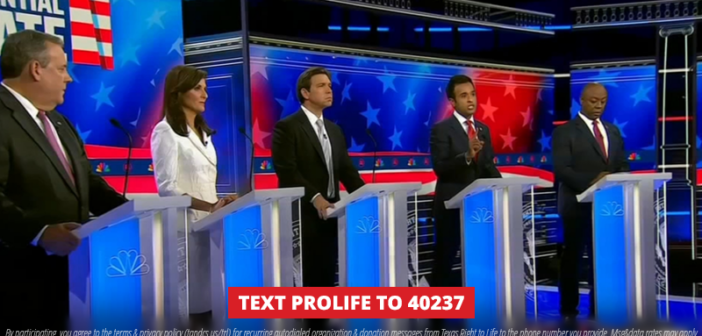In Miami, the third Republican presidential debate brought together five of the candidates vying for the nation’s highest office. The candidates sought to resonate with American voters on a range of issues. A pivotal moment occurred towards the end of the debate when the moderators inquired about the candidates’ positions on abortion given the previous night’s election, which included Ohio passing a constitutional amendment allowing abortion until the moment of birth.
The discussion commenced with Florida Governor Ron DeSantis reaffirming his commitment to a Culture of Life. He shared a story about a Jamaican woman who made the difficult choice to not have an abortion, and that child ultimately grew up to become a justice on the Florida Supreme Court. In light of the recent tragic vote in Ohio, DeSantis stated that every state will approach the issue differently, and that creating this Culture of Life starts from the bottom up.
Former UN Ambassador Nikki Haley followed, stating she was Pro-Life but undercutting that with the content of her message. She stated that Dobbs v. Jackson righted the wrong of Roe v. Wade by taking the abortion issue back out of the hands of unelected judges and giving it to the people. She said that while she is Pro-Life she doesn’t judge anyone for being pro-choice and that it is a private decision to be made by individuals. She emphasized a consensus approach on abortion, while discounting any opportunity or even attempt for federal action to protect preborn children, including an unwillingness to commit to supporting a 15-week ban on abortion.
In contrast, South Carolina Senator Tim Scott took the strongest stance by pledging to push for a federal 15-week abortion ban. He even challenged DeSantis and Haley by name to join him in committing to a 15-week ban. Scott did not stop there, stating that we need to fund Pro-Life resources such as pregnancy resource centers.

Don’t miss important Pro-Life stories like this.
>> Get the Pro-Life Weekly Highlight just once a week:
Businessman Vivek Ramaswamy addressed abortion for the first time in the debates, expressing dismay at the Pro-Life setback in Ohio as a native of that state. He suggested that one reason the Pro-Life issue fell short in Ohio is because no alternatives were presented. Ramaswamy proposed that one way to address abortion and unexpected pregnancy is to encourage sexual responsibility in men.
Former New Jersey Governor Chris Christie was the final candidate to weigh in, echoing his previous weak stance that the federal government should not intervene in protecting preborn children from abortion. He claimed that Dobbs was a victory, but that conservative lawyers had been arguing for 50 years that the federal government should have no hand in the issue. He believes protecting Life is not the federal government’s role and emphasized the importance of allowing each state to decide its Pro-Life or anti-Life policies, even if he personally found the abortion-until-birth position of New Jersey, his home state, morally reprehensible.
Overall, this debate did not reveal much new information about these candidates’ stance on the Pro-Life issue. However, it did reinforce their perspectives in the aftermath of recent losses. It is reassuring to see that the stronger candidates remained resolute and unyielding in their Pro-Life convictions despite the election outcomes on November 7.
As we look ahead to the 2024 presidential election, Republicans must choose a resolute Pro-Life candidate. The Republican Party is the only one that overtly states support for protecting preborn children from elective abortion, and the Republican candidate must advance this position. Our nation needs a leader who is unwavering in protecting innocent human Life.
Thank you for reading this story! If you support our Pro-Life ministry, chip in with a life-saving contribution today!



